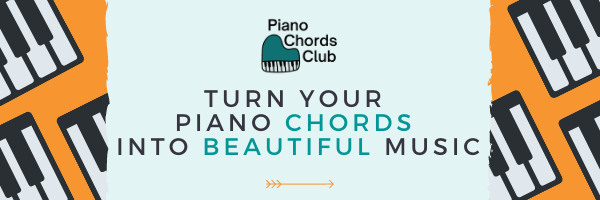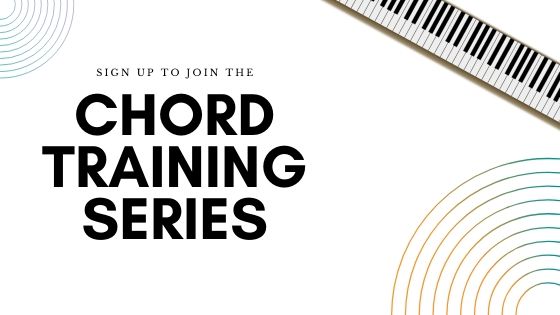Cm Piano Chord & How To Play It
The Cm piano chord is a minor chord and made up of the notes C Eb and G.
This is a pretty common chord and a good one to understand and have memorized. We're going to learn more about the C minor chord here including:
- Cm piano chord notes
- Cm piano chord chart
- how to play C minor chord on piano
- which finger to use
- Cm/G piano chord
- Cm/Eb piano chord
- the inversions for C minor chord
- and some theory to understand this chord
Cm Piano Chord Notes
The Cm piano chord notes are C Eb G.
These are the notes in root position order but remember, they can be played in any order on the piano. Just keep the C as the bass note for the most part.
I usually play C in my left hand and the chord in my right hand.
Cm Piano Chord Chart
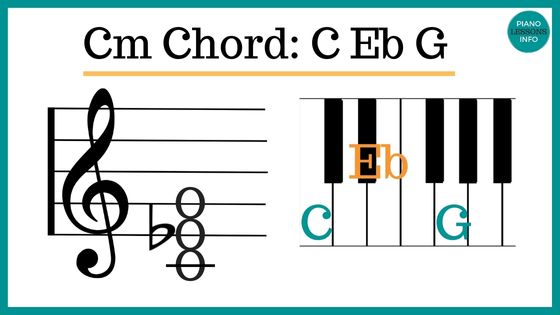 C minor chord chart
C minor chord chartHow To Play Cm Chord On Piano
This short video will show you the notes of the C minor chord, how to play it and you'll also be able to hear what it sounds like.
Cm Piano Chord Finger Positions
You can use the standard chord fingering - thumb, middle finger and pinkie (1 3 5 in piano finger numbers) - for this chord.
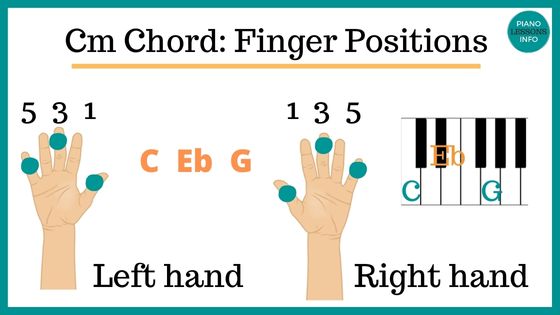
The standard fingering for a chord doesn't have to be used all the time but I recommend using it as a beginner to get it into your muscle memory. And then branch out after then.
Does Cm Mean Major or Minor?
With piano chord titles, capitals matter. So any time you see a lowercase m, it refers to something minor.
So, Cm, F#m, Bbm, are all minor chords.
Cm7, F#m7, Bbm7 are all minor seventh chords.
Capital M's are used to refer to something major. For example, CM7 is C major seventh.
What you usually don't see if a capital M for just a major chord. For example, CM. If you see this, you may need to play the chord to see if it's correct in terms of the other chords around it. It could be incorrect with someone writing a capital M in place of a lowercase m. And if you're not sure, trying finding another chord sheet for that song and compare the two.
Cm/G Piano Chord
When you see a slash chord, the note that comes after the slash is your bass note for the left hand.
So for Cm/G, play the note G as your lowest left hand note (bass note) and the Cm chord notes (C Eb G) above that.
Cm/Eb Piano Chord
When you see Cm/Eb, it means to play Eb as the lowest note in the left hand. It's your bass note. And play the other notes of the chord about that.
Usually, C would be your bass note but in this case, they're going for a different sound and you play Eb instead.
Cm Chord Progression for Piano
Here are some good, basic chord progressions to practice the Cm chord with:
Cm Chord Progression 1:
Cm Fm Eb G
Cm Chord Progression 2:
Cm Eb Bb Gm
Cm Chord Progression 3:
Eb Ab Cm Bb
And here are some tips on practicing chord progressions.
Inversions of C Minor Chord
Inversions are great to practice and C minor chord inversions at a good intermediate level.
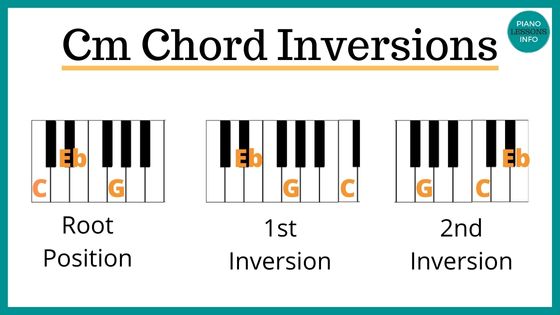
The inversions for the Cm chord are:
Root position: C Eb G
1st Inversion: Eb G C
2nd Inversion: G C Eb
Chord Theory for C Minor Chord
There are 2 ways to understand the chord theory behind a minor chord.
First, you can use the C minor scale. C minor chord is built off of the first, third and fifth notes of the minor scale.
Second, you can use the major scale - in this case, C major scale. We want to take the first, third and fifth notes of the major scale (C E G) and then lower the 3rd note by one semi-tone. This means E becomes Eb. And that's how we get the minor chord, C Eb G.
If you need to look up more chords, visit the Piano Chord Charts page or download your own copy below.
Free Download:
Ultimate Chord Cheat Sheet
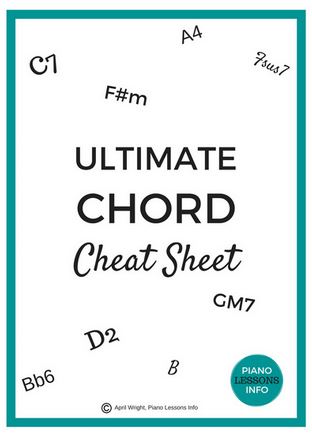
Subscribe below and get free access to the (printable) Ultimate Chord Cheat Sheet.
Recent Articles
-
Piano Notes Chart
Nov 20, 23 10:21 PM
Find a piano notes chart for treble clef and bass clef notes as well as the different types of notes. -
D Chord on Piano + Diagram, How To & Theory
Oct 24, 23 12:20 AM
Learn how to play the D chord on piano with diagram, fingering, D/A, D/F# and a theory explainer. -
Diminished Piano Chords: Chart & How to Make Them
Oct 09, 23 09:23 PM
Learn the different diminished piano chords and how to make them. Here you'll find both a diminished chord chart and an explanation.
- Home
- 14 Day Chord Challenge
- Cm Piano Chord
Free Download:
Ultimate Chord Cheat Sheet

Subscribe below and get free access to the (printable) Ultimate Chord Cheat Sheet.



